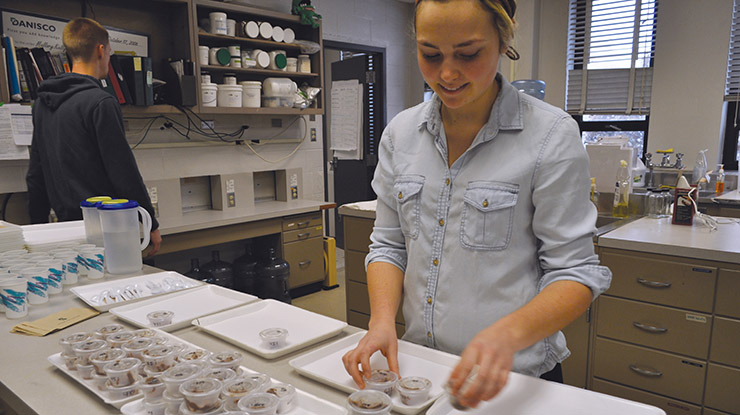Food Science Programs
The Food Science program at Michigan State University is a multidisciplinary program that combines science learning and application to develop new food products and processes to improve the safety and quality of food.
The Department of Food Science and Human Nutrition that offers Food Science has:
- Roughly 40 faculty members
- Roughly 40 graduate students
- More than 500 undergraduate students

Undergraduate
The Food Science undergraduate program provides comprehensive preparation in the basic sciences including chemistry, biochemistry, microbiology and physics. The bachelor's degree is internationally recognized by the Institute of Food Technologists.
Many students participate in internships at food companies and industries. Students can receive course credits for internships while gaining invaluable professional experience.
Graduates are employed by food and related industries, federal and state governments, and universities to work at the interface between the production and delivery of food. There are more positions available for food scientists than graduates to fill them.
Academic Advisor

Jeff Swada
Associate Professor, Director of Undergraduate Studies, Director of Undergraduate Food Science Program, Food Science Undergraduate Academic Advisor, Food Processing Complex Manager and Mobile Lab Liaison
swadajef@msu.edu
517-884-5993
Graduate
Students who are admitted into the Food Science graduate program carry out research in either:
- Food safety and toxicology
- Food processing and quality enhancement
A student who is admitted to the Food Science graduate program is expected to have general quantitative and organic chemistry and biochemistry experience. In addition, preparation for graduate work should include courses in the biological and agricultural sciences, mathematics, physics, nutrition, engineering or economics.
The Food Science graduate programs include a master's degree in food science either with thesis or with coursework. The doctoral program two seminar courses and an appropriate selection of courses that support the Ph.D. research directions.
Additionally, there is a joint Food Science/Environmental Toxicology graduate program elated to the harmful health effects of environmental or other chemical. This multidisciplinary dual-degree graduate program allows students to obtain dual degrees in Food Science and Integrative Toxicology through MSU's Program in Environmental and Integrative Toxicology Sciences.
For more information about the Food Science Graduate Program, please see the Graduate Page.



 Print
Print Email
Email